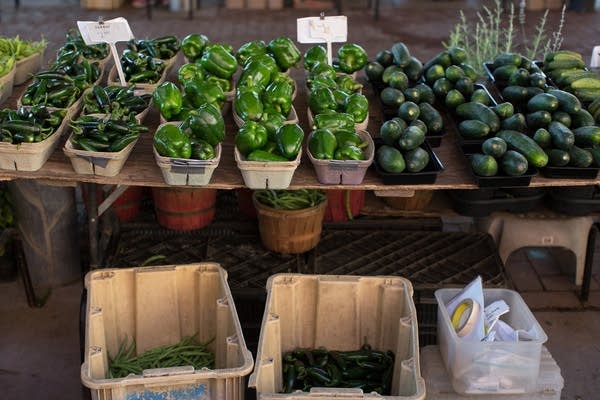Appetites: Hmong influence strong in Minnesota farmers markets

Go Deeper.
Create an account or log in to save stories.
Like this?
Thanks for liking this story! We have added it to a list of your favorite stories.
Beth Dooley, author of "Minnesota's Bounty: The Farmers Market Cookbook," joined MPR's Tom Crann to talk about one of the most influential communities in Minnesota farmers market culture -- Hmong growers.
• More: Food news and reviews
She discussed what makes Hmong farmers different and what farmers markets and ingredients to look for.
Turn Up Your Support
MPR News helps you turn down the noise and build shared understanding. Turn up your support for this public resource and keep trusted journalism accessible to all.
The Hmong are terrific farmers and have a terrific aptitude for growing everything from their traditional ingredients to produce that is difficult to grow in this area (i.e. sweet potatoes, jicama, peanuts).
Because the Hmong come from a traditional farming heritage, they are familiar with organic practices and shun expensive toxic fertilizers, pesticides and herbicides. Their farms are multi-generational and their family systems are strong.
First generation farmers who settled here in the '60s and '70s have adult children who are college and post college educated. Take Pakou Hang, director of the Hmong American Farmers Association (HAFA). She and her adult siblings — all professional architects, doctors, etc. still return every summer to help with the family farm stand at the St. Paul Farmers Market.
The most impressive thing about these vendors is the relationships that have developed through the years. The elders struggle with English so it's the teenagers who take care of the market transactions, making change and helping answer my questions about their food.

The best markets to find vendors (click the place markers for details)
Here are a few of the ingredients to look for

• Snow peas and pea vines: (though we're at the end of that season) Use them fresh in salad, or in soups, stews and stir fries.
• Cilantro: A great herb that people either love or hate. To some people, it tastes like soap. Heat destroys the flavor so it should be used in cold dishes or added to hot foods at the last minute.
• Lemongrass: It is very fragrant, makes a lovely tea and is great steeped into soups or chopped and tossed into salads and stir fries.
• Thai basil: A smaller, very potent basil that, unlike the globe or Italian basil, stands up to heat, so it's great in soups and stir fries.

• Mustard greens: You'll find two different kinds -- the flower, best used fresh in salads or lightly cooked in stir fries and the bitter, that is great in pork stews and stir fries.
• Long beans: Like green beans, but they can be a bit tougher and stringier and their flavor is more distinct.
• Amaranth: Sold in sheafs that can either be decoration, or simply shaken to release the tiny brown grains. It's gluten free and cooks, like any cereal grain, in water or broth for about 20 minutes or tender. I prefer to use it in salads with other grains (faro, rice, wild rice) or in vegetable soups.
• Bitter melon: Looks like a weird, rigged warty cucumber, and is quite bitter -- you don't want to eat it fresh. Its brilliant, pinkish flesh is best when simply sliced, salted and drained then rinsed and dried before stir-frying or sauteing. It's known for its cleansing medicinal properties that are believed to help balance blood sugar. One grower told me that a mixologist is creating bitters for cocktails with the seeds.
• Hmong peppers: Typically fiercely hot -- they are red, thin and short. Their traditional names translated are whimsical -- chicken leg horn is my favorite, named for the little piece that sticks out from the back of a chicken's leg.
Recipes

Bitter Melon Stir-Fry
Serves 4
Bitter melon is best when it is a little past its prime, the more bigger, pale bitter melons are more mature and less bitter.
1 pound bitter melon, seeded and sliced Coarse salt
1-2 tablespoons vegetable oil
2 cloves garlic, minced
Generous pinch of crushed red pepper
2 tablespoons soy sauce or more to taste
1 tablespoon rice wine vinegar
1 teaspoon brown sugar or honey
Toss the bitter melon slices with a little salt and place them in a colander. Let the melon drain for about 20 minutes. Rinse with cold water and pat dry.
Film a large skillet or wok with the oil, set it over medium-high heat, and stir-fry the garlic with the crushed pepper quickly before tossing in the bitter melon. Stir-fry until the bitter melon begins to brown slightly and then add the soy sauce, vinegar and sugar or honey.

Hmong Chicken Salad with Basil and Cilantro
Serves 4
This refreshing salad can be prepared ahead and serve over bean sprouts for extra crunch.
1 Hmong pepper, seeded and minced (start with one and add more to taste)
3 cloves minced garlic
3 tablespoons Asian fish sauce
4 tablespoons fresh lime juice
2 teaspoons sugar
1 tablespoon dark sesame oil
2 stalks fresh lemongrass, root ends trimmed and the lower 6-inches thinly sliced
1 large shallot, chopped
2 scallions, white parts and half of the greens, sliced
1/2 cup chopped fresh cilantro
1/4 cup chopped fresh mint
2 to 3 tablespoons chopped Thai basil
1 pound cooked chicken, cut into chunks
2 cups bean sprouts, optional
Fresh greens to serve the salad on
In a large bowl, whisk together the pepper, garlic, fish sauce, lime juice, sugar and oil. Stir in the lemongrass, shallot. Toss in the scallions, cilantro, mint, basil and the chicken and toss so that all of the ingredients are nicely coated. Serve on a bed of bean sprouts and dark greens.


